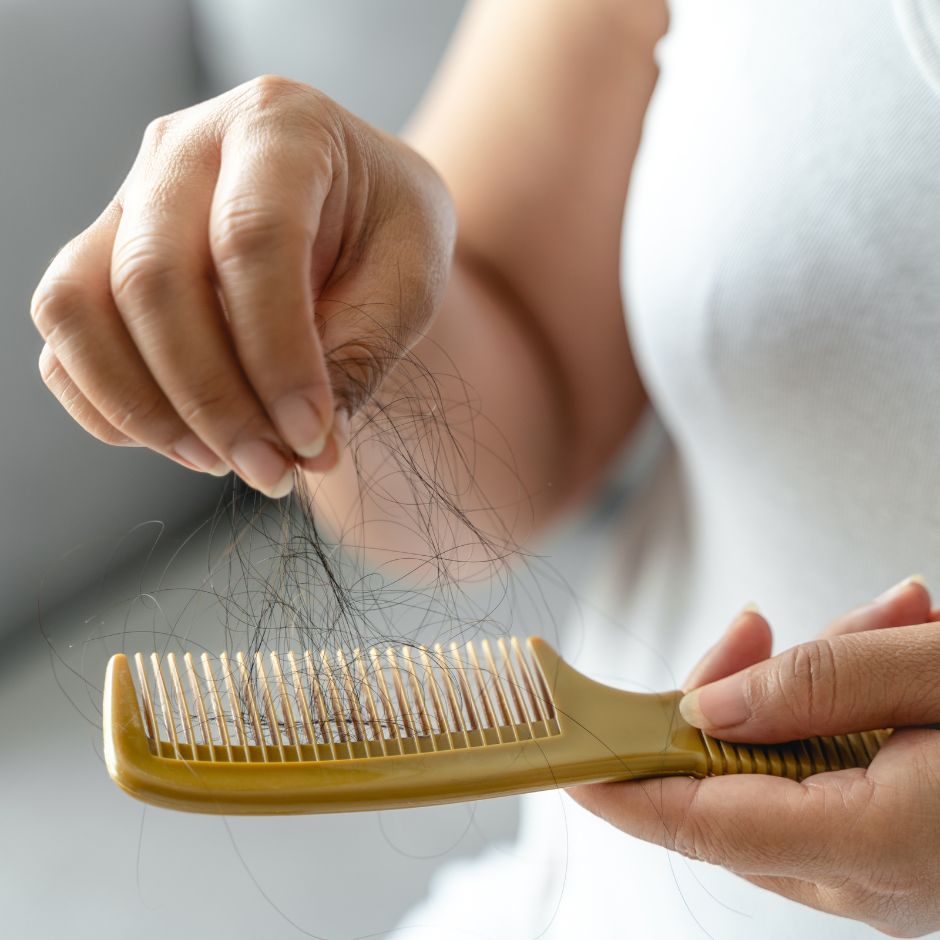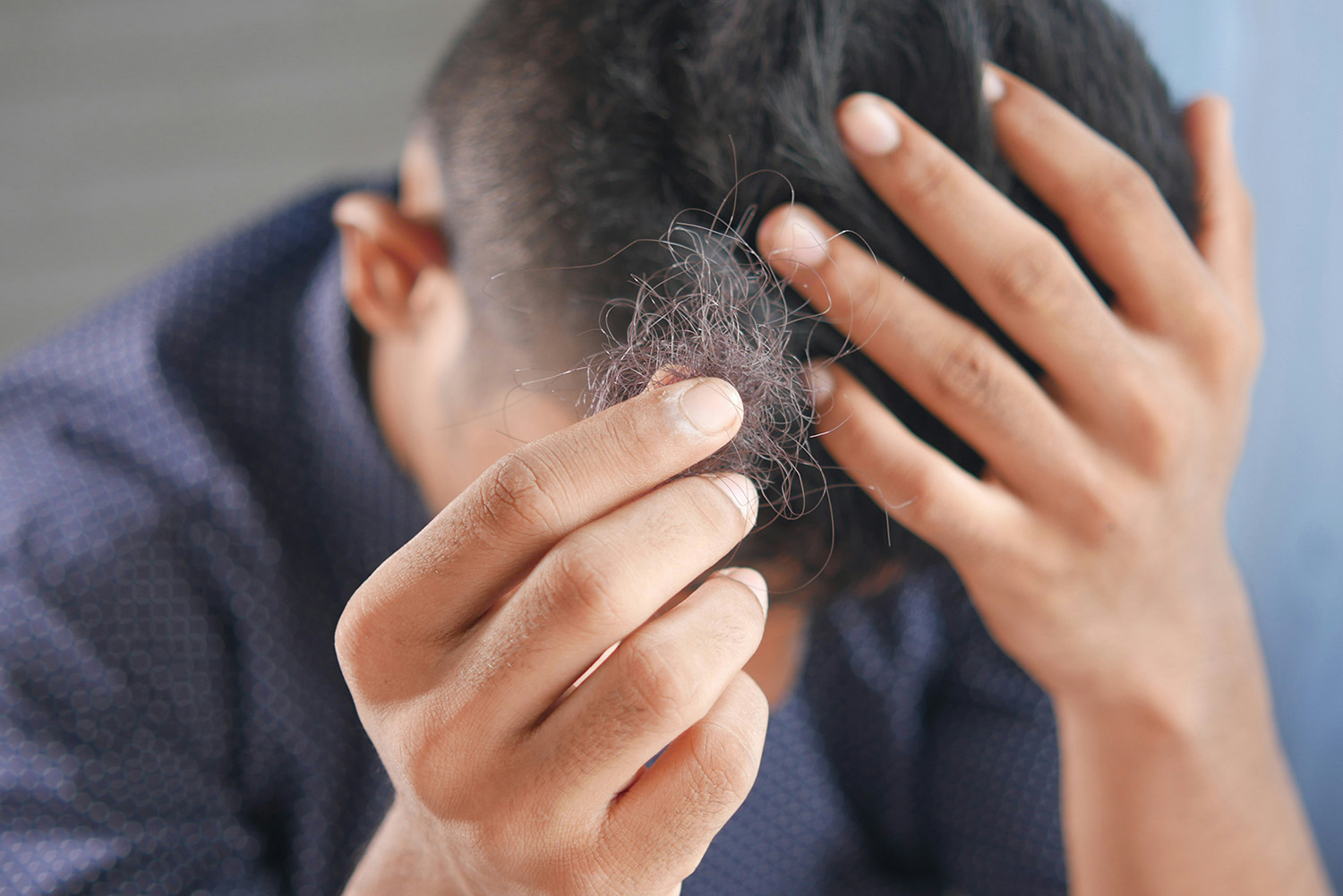Traditional Chinese Medicine for
Hair Loss Treatment

Hair Loss Treatment with Traditional Chinese Medicine
The growth of technology has meant that people now spend more time on their laptops, watching television and surfing smart phones then doing outdoor activities. Furthermore, as per serval surveys conducted recently an average Indian spends around 4 to 5 hours on their mobile phones. The trend is similar in developed countries like Canada, UK, Germany, France, The USA, etc.
As a result the exposure to radiation has increased multifold resulting in several health hazards such as increased stress, headache, body ache, hair loss, etc. Amongst these, the most visible side effect of modern lifestyle has been the hair loss issue. In fact, as per the American Hair Loss Association nearly 66 percent men will experience hair thinning before the age of 35 years.
It is also estimated than nearly 80 percent people will lose hair once in their life time. While, it is a natural phenomenon, excessive hair loss is a worrying sign. Thus, it is recommended that people across all age groups should resort to natural medication such as Chinese treatment for hair loss. These medicines make use of herbs which means patients do not have to worry about side effects.
About Hair Loss Treatment Treatment
The next step in this process is treatment. TCM practitioners with their years of experience in treating qi deficiency take into account all aspects before initiating the treatment. Once this is done, the customized treatment starts which includes.
- Traditional Chinese herbs – These are effective, efficient and have no side effects.
- Nutritional therapy –This includes complete overall or modification of eating habits, diet plan, elimination of some foods, etc.
- Exercise
- Lifestyle changes, etc.
In summary, with TCM, patients are assured of lasting and effective Qi (Chi) treatment.

However, it must be noted that TCM hair loss treatments can prove effective only if patients adhere to all conditions prescribed during the treatment stage. This includes diet plans, medicinal dos and don’ts, lifestyle modifications, etc.
Chinese herbal medicine hair growth is an assured treatment for a confident life provided people are patient and not looking for quick-fix solutions. These medicines offer long-term relief from hair loss problems and support hair regrowth. Hence, practitioners advise people to continue using Chinese herbs till this issue is fully resolved and hair growth gains traction.
Essential Chinese Herbs For Hair Growth
1. He Shou Wu (Radix Polygoni Multifori) 何首乌
Commonly known as Fo-Ti, is the most well-known herb in Chinese medicine for hair loss. Revered in traditional Chinese medicine (TCM) hair loss treatments, He Shou Wu is believed to nourish Yin, Blood, and Jing, essential elements in promoting overall vitality and hair health. In TCM, this herb is known to support hair growth and darkening of the hair, particularly for those with pre-grey hair, although it is important to note that it will not alter the color of naturally red or blonde hair, nor color-treated hair. As a potent adaptogen, He Shou Wu is also celebrated for its longevity-promoting properties, making it a staple in Chinese herbs for hair growth.
2. Gou Qi Zi (Fructus Lycii) 枸杞子
Widely known as Goji berries, is another powerful TCM hair loss remedy. This well-known herb is said to balance Yin, Blood, and Jing, and is widely consumed both as a food and in medicinal preparations. Gou Qi Zi is rich in vitamins A and C, which are crucial for healthy hair growth by promoting scalp hydration and enhancing iron absorption, respectively. The high antioxidant content of Goji berries, including carotenoids, flavonoids, and polyphenols, helps protect the scalp and hair follicles from oxidative stress, a common cause of hair thinning and loss.
3. Nu Zhen Zi (Fructus Ligustri Lucidi) 女贞子
Another prominent herb in Chinese medicine for hair loss. Known for its powerful Yin-nourishing properties, Nu Zhen Zi is frequently used to support liver and kidney health, which are believed to be closely connected to hair vitality in TCM. This herb is particularly valued for its ability to darken hair and prevent premature graying, making it a popular choice in traditional Chinese medicine hair loss remedies. It also strengthens and nourishes hair follicles, reducing hair loss and promoting thicker, healthier hair.
4. Shu Di Huang (Radix Rehmanniae Preparata) 熟地黄
A highly regarded Chinese herb for hair growth due to its potent tonifying properties. It nourishes Yin, Blood, and Jing, and is known for its ability to promote hair growth. However, due to its “cloying” nature, it should be consumed in moderation to avoid digestive discomfort. Shu Di Huang is also believed to “fill the marrow,” benefiting both mental health and hair vitality.
5. Sang Shen (Fructus Mori) 桑椹
Known more widely as mulberry fruit, is a powerful Yin-nourishing herb that tones the Blood and is commonly used in TCM hair loss treatments. It is known to enhance the production of bodily fluids and maintain skin and hair suppleness. Dried mulberry fruit, often found in supermarkets and online, is a popular food item that also supports healthy hair growth. Together, these herbs form a comprehensive approach in traditional Chinese medicine hair loss treatments, offering natural solutions to maintain and restore hair health.
Some other important herbs include:
Herbs that are thought to be best at restoring healthy hair include the following:
- Black Soybean (Heidou, 黑豆)
- Black Sesame Seeds (Heizima, 黑芝麻)
- Cistanche (Roucongrong, 肉苁蓉)
- Cnidium (Chuanxiong, 川芎)
- Cordyceps (Dongcongxiacao, 冬虫夏草)
- Chinese Angelica (Danggui, 当归)
- Dodder Seeds (Tusizi, 菟丝子)
- Eclipta (Mohanlian, 墨旱莲)
- Fleeceflower Root (Heshouwu, 何首乌)
- Japanese Teasel Root (Xuduan, 续断)
- Lingzhi (灵芝)
- Mulberry Leaf (Sangbaipi, 桑白皮)
- Psoralea Fruit (Buguzhi, 补骨脂)
- Prepared Rehmannia Root (Shoudihuang, 熟地黄)
- Privet Seeds (Nvzhenzi, 女贞子)
- Solomon’s Seal Rhizome (Yuzhu, 玉竹)
Best Foods for Hair Growth in Traditional Chinese Medicine
In Traditional Chinese Medicine (TCM), diet plays a crucial role in promoting hair health and growth. Certain foods are believed to nourish the organs and systems that influence hair growth, such as the liver, kidneys, and blood. Here are some of the best foods for hair growth according to TCM principles:
- Black Sesame Seeds (黑芝麻 – Hēi Zhī Ma): Highly valued in traditional Chinese medicine for hair growth, black sesame seeds nourish the liver and kidneys, which are closely linked to hair health. They are believed to promote hair growth and prevent premature graying.
- Walnuts (核桃 – Hé Táo): In TCM, walnuts are known to nourish the kidneys and strengthen the hair. They are rich in essential fatty acids and vitamins that support scalp health and hair growth.
- Eggs (鸡蛋 – Jī Dàn): Eggs are a good source of high-quality protein and are considered in TCM to strengthen the blood and nourish the essence (Jing), which is vital for hair health and growth.
- Black Beans (黑豆 – Hēi Dòu): Black beans are associated with kidney nourishment in TCM and are thought to promote hair growth and restore hair color. They are rich in protein, iron, and biotin, all essential for healthy hair.
- Seaweed (海藻 – Hǎi Zǎo): Seaweed is believed to nourish the blood and kidneys, supporting hair growth and preventing hair loss. It is rich in minerals like iodine, crucial for thyroid health, which indirectly influences hair health.
- Spinach (菠菜 – Bō Cài): Rich in iron and vitamins, spinach is considered in TCM to support liver health, which is linked to hair vitality and growth.
- Black Rice (黑米 – Hēi Mǐ): A staple in some regions, black rice is believed to nourish the blood and kidneys in TCM, contributing to healthy hair growth.
- Dates (红枣 – Hóng Zǎo): Red dates, or jujubes, are commonly used in TCM to nourish the blood and improve circulation, which can help promote healthy hair growth.
Send a Message
If you have any questions please feel free to send us a message and we will get back to you as soon as possible.
English
905-415-6999
Email
info@tcmplus.com